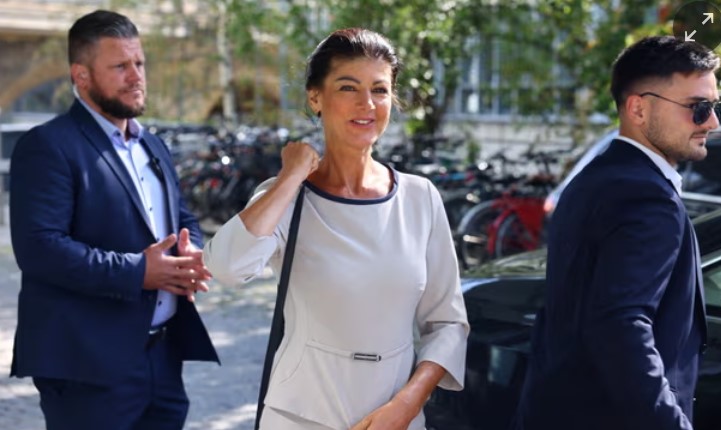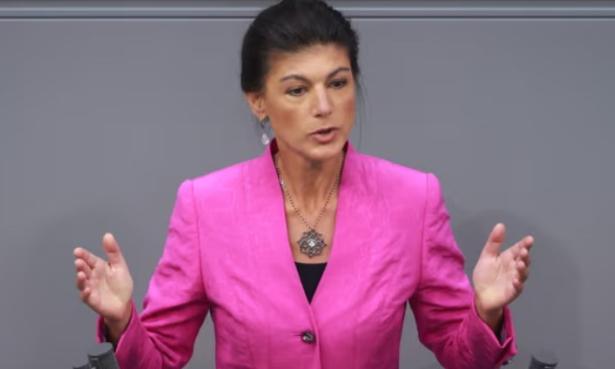Unease As Russia-Friendly ‘Queen of the Elections’ Aims for More German Poll Success
Sahra Wagenknecht is not even on the ballot in the upcoming state election in Brandenburg. But her face is plastered on billboards across the sprawling, largely rural northern state that surrounds Berlin.
There she hopes her fledgling Sahra Wagenknecht Alliance (BSW) will repeat the successes it enjoyed in polls in Thuringia and Saxony earlier this month, where it came third with vote shares in the double figures, performing so well that it is now a kingmaker for any possible coalition in either state.
The centre-right is grappling with how it can keep the far-right Alternative für Deutschland (AfD) party out of the governments in those two states, where the AfD took more than 30% of the vote in each, coming top in Thuringia. With the latest polls showing the AfD ahead in Brandenburg, the same scenario could be repeated on Sunday.
So it is that Wagenknecht, a former communist who once stood on the periphery as a protest politician, has been thrust into the limelight as a core player advocating a distinctive brand of “left conservatism”. And while some see her eponymous alliance as a potential bulwark against the AfD, others point to its anti-migration rhetoric and Russia-friendly foreign policy as reasons to be wary.
Acknowledging the power she holds, Franz Josef Wagner, the long-serving columnist of the tabloid Bild, recently referred to her as a “queen of the elections” who could become “Queen of Darkness” or “Queen of Light”, depending on which direction she takes.
“I’m pinning my hopes on her,” said Regine Hirsch, 80, a retired chemical laboratory technician, who had left a weekly game of cards with some girlfriends in order to come and hear Wagenknecht speak at the BSW’s first election rally in the riverside city of Brandenburg an der Havel.
“Whether everything she says is to be believed, I cannot say,” she said, rubbing her hands against the chill of an autumn breeze. “But I’ve always quite liked her, and anything to keep the Nazis out will be my motto when I go to vote on 22 September,” she added, in reference to the AfD.
In a passionate 35-minute address to a crowd of about a thousand people gathered on Brandenburg an der Havel’s market square, Wagenknecht made brief reference to the BSW’s success “from an almost standing start” in Thuringia and Saxony, where governments without it are now almost impossible.
Brandenburg voters could ensure a similar result, she said, “and in so doing, send a signal to the unspeakable government in Berlin”, which, she mocked, lived in its own detached capital-city “bubble of organic food shops, lattes and cargo bikes”.
Laughter and applause rippled across the square. Then Wagenknecht launched into one of her big campaign themes: Ukraine and the defence policy of the chancellor, Olaf Scholz.
Speaking to the crowd, Wagenknecht derided the government’s decision to cut off supplies of Russian gas, blaming the move for Germany’s cost of living crisis. If she were given the chance, she added, she would push for a diplomatic solution to Russia’s invasion of Ukraine. She suggested Vladimir Putin was no more of a warmonger than the United States.

To many, such claims are deeply disturbing, redolent of reactionary anti-western, anti-Nato propaganda. For the historian Ilko-Sascha Kowalczuk, the BSW and the AfD are “siblings in spirit” – both populist parties that reject western values. Calling the former “Putinists” and the latter “fascists”, the author said a vote for either was an expression of the ancient proverb “the enemy of my enemy is my friend”.
“Not since reunification in 1990 is democracy and freedom in such danger as it is now,” he told the Süddeutsche Zeitung.
In Brandenburg an der Havel, however, the message was going down well with Cornelia Pelzer, a self-employed businesswoman from a nearby town who had travelled to hear Wagenknecht speak.
“I’m 150% behind her insistence on pushing for peace,” she said. “She reflects the consciousness of many other Germans on this score, which is why she’s so successful. She’s a complete counterpoint to our war-mongering government,” she added, in reference to the continued military support the government has given to Ukraine.
Pelzer said she had long been a Wagenknecht fan and had chosen to follow her when she broke away last year from the leftist Die Linke party – “who were mired in trench warfare” – with a band of her supporters to form the BSW.
Manfred Köhler, 67, who spent 45 years as a shift worker at the local steelworks, admitted he was unconvinced by Wagenknecht and was more likely to vote for the AfD. “But I live in hope that her lot, despite what they say, and the AfD will band together,” he said, sitting on the edge of a flower bed and drawing on a cigarette after the rally.
Wagenknecht has, like the established parties, ruled out a coalition between her party and the anti-migration, anti-Islam AfD, although she has been less insistent about refusing any cooperation whatsoever, suggesting the two could work together where their party programmes align. She has been eager to show empathy towards AfD supporters in the hope of luring them to her BSW, saying many chose to vote for the party “not because they’re far-right but because they are furious”.
Obvious overlapping goals include limiting migration, increasing the deportations of rejected asylum seekers and tightening controls at Germany’s borders (a step already taken by the government on Monday). Wagenknecht has said Berlin needs to send the message to the world that “Germany is overwhelmed, Germany doesn’t have any more room, Germany is no longer prepared to be destination number one”.
Köhler said that, as a Brandenburg voter, overwrought public services, a lack of integration and security were among his main concerns. “My granddaughter is in the second year of school and over half the class is not able to speak German,” he said. “All I know is that this situation can’t continue, and that the established parties have to be ousted.”
But did he trust parties that had never before held positions of political responsibility? “If they’re no good, they’ll be out after five years,” he said. “But you have to give them a chance. They can’t do any worse than the current lot. And you can’t label me a Nazi for suggesting it. That’s a cheap shot – that was 85 years ago.”
[Kate Connolly is the Guardian and Observer's Berlin correspondent. Kate Connolly's public key ]


Spread the word